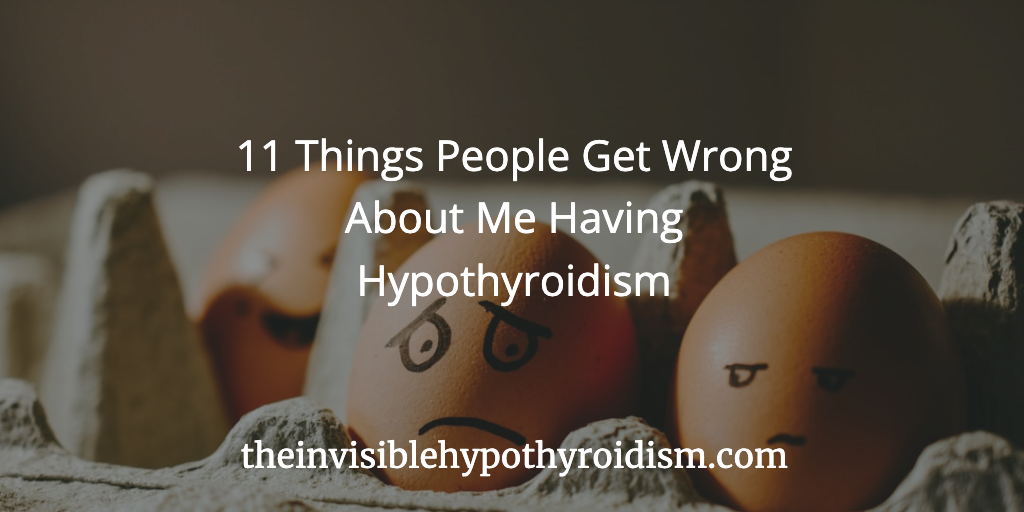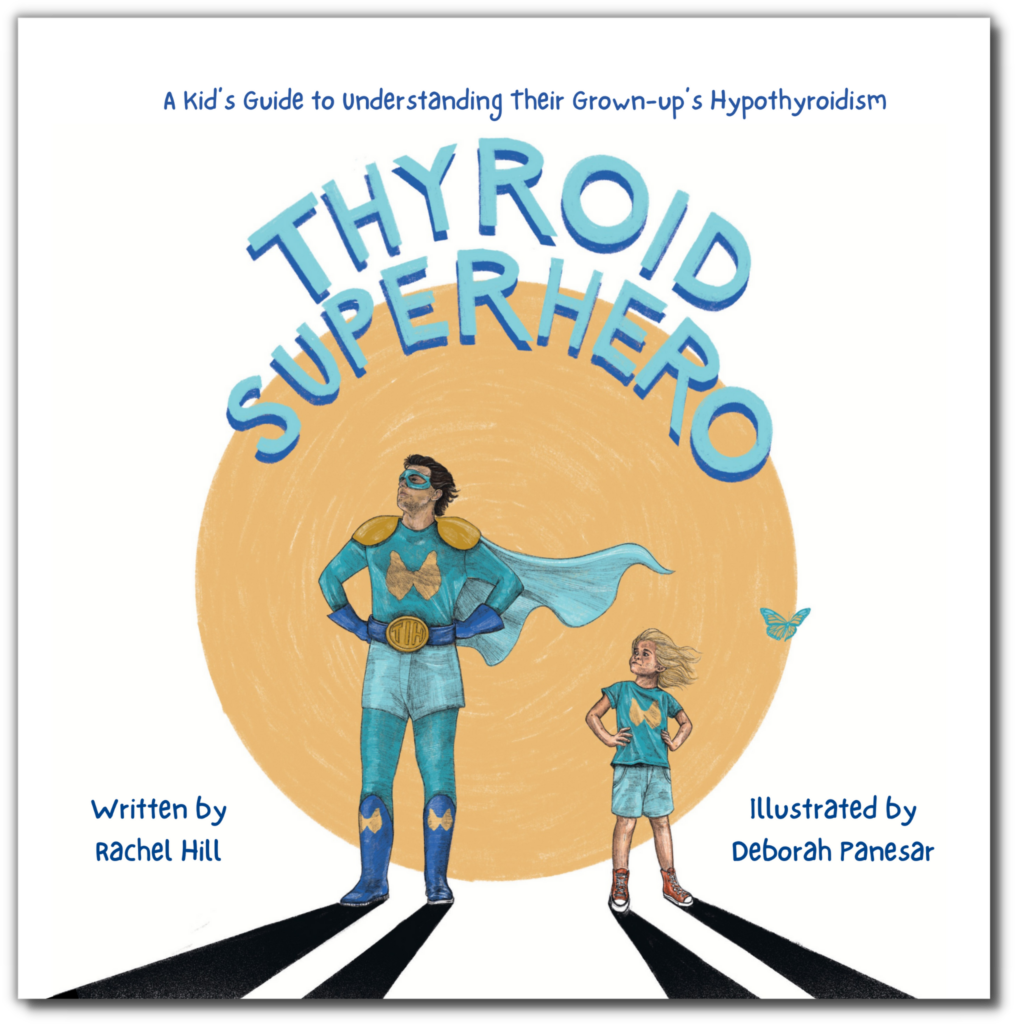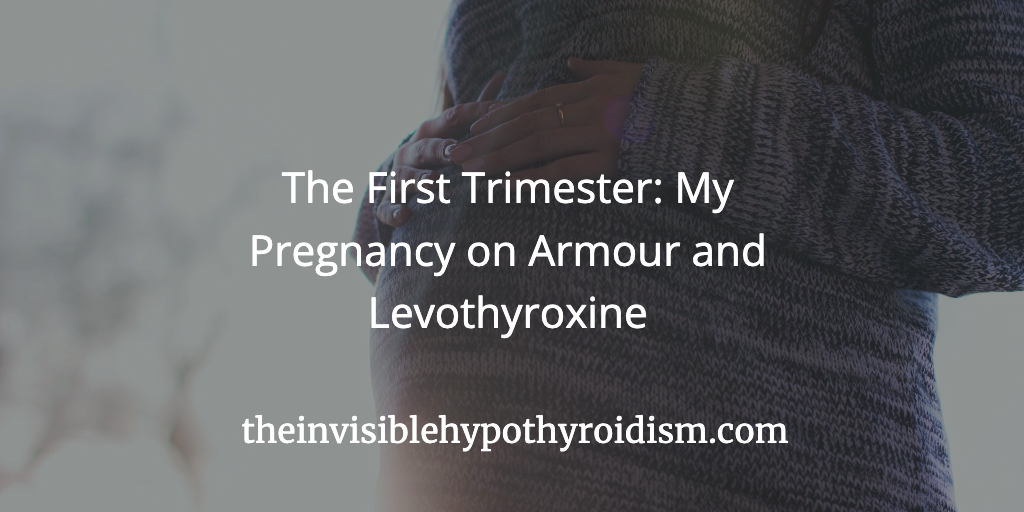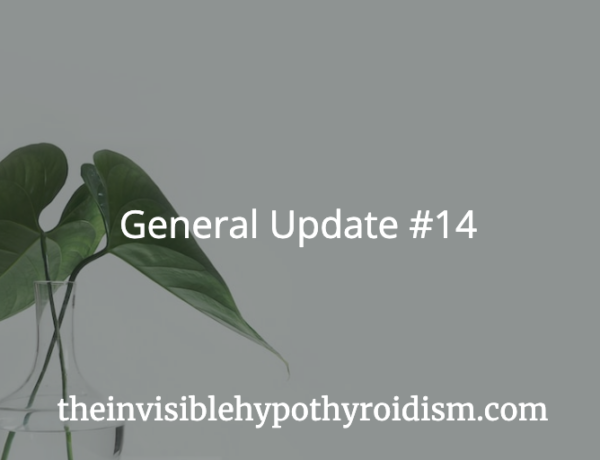Originally published on 22nd February 2016 Last updated on 22nd April 2024
I have hypothyroidism.
Autoimmune thyroid disease.
An underactive thyroid.
And I often face incorrect assumptions about it, so thought I’d address some of the most common ones.
Before I start, I wanted to point out that I have broken a lot of these down even further in my bestselling thyroid patient book “Be Your Own Thyroid Advocate: When You’re Sick and Tired of Being Sick and Tired”, which also includes them in a chapter for your friends and family!
1. “You have thyroid medication that you take daily, so you must be fine now.”
Wrong! So very wrong. Unfortunately, it’s not that simple, and so many people stay unwell for a long time because of this. Even if we do get better, our health condition, like many others, can have bumps where we become unwell again. Thyroid flares are real.
It can take months or even years for people to get their thyroid medication right. Many have to try different types. So don’t just assume we’re OK once we get medication for it. Ask us; we’re happy to talk to you about how we’re doing.
2. “Having a ‘thyroid problem’ is an excuse for weight gain.”
Whilst gaining weight with an underactive thyroid is a legitimate symptom of the condition, some patients also don’t experience this.
The main purpose of thyroid hormones, produced by the thyroid gland, is to ensure the metabolism is running properly, and the metabolism’s job is to produce heat and fuel to keep us warm and give us energy. Now, being underactive, we don’t have enough thyroid hormones being produced, so our metabolism doesn’t work properly. Therefore, people with an underactive thyroid have a slow metabolism, so will have symptoms associated with a slow metabolism, such as cold intolerance, extreme tiredness and weight gain.
However, since we’re all individuals, this can differ from person to person, based on our genetic make up, our lifestyles and any other health conditions we have, so some people don’t experience weight gain. Some even experience unintentional weight loss.
If someone is hypothyroid and has extra weight, it is likely that this could be caused by their sluggish thyroid gland.
3. “It’s an easily managed condition.”
This one makes me laugh out loud. Did you know that a healthy thyroid gland adapts? For example, it works harder to produce more heat on a cold day, to keep us at a normal body temperature. For those of us with a rubbish thyroid, it doesn’t really do this, so we can feel the cold more than others, take longer to recover from exercise and exertion and struggle more than the average person on a lack of sleep.
Did you know that what we eat, drink, how much sleep we get, life stressors, other conditions etc. all impact our thyroid? So we have a lot to juggle to try and keep it in check.
Many people need altered medication dosages, going up and down in dosage. Just as they start to feel well, they can feel worse again! We often also develop other conditions that need managing alongside our hypothyroidism.
4. “It’s not life threatening.”
Advanced hypothyroidism, known as myxoedema, is a rare but life-threatening condition. Myxoedema, or a myxoedema coma, is where the body is so starved of the crucial hormones made by the thyroid gland, that it shuts down.
If hypothyroidism is adequately controlled, then yes, you won’t die.
But if I didn’t take my thyroid medication, I would quite simply die.
So yes, it is potentially life threatening and crucial that we receive proper treatment for it and remember to take our medication.
On another note, inadequately treated hypothyroidism often leads to mental health issues such as depression and anxiety. I was suicidal myself, when not properly medicated and hypothyroid, so yes, this is another way that it is potentially life threatening.
5. “Men can’t get it.”
Although less common, yes, men can have hypothyroidism and other thyroid issues. A GP once told me that for every eight or nine women who have it, one man does.
6. “It’s caused by not wearing enough layers.”
Although this won’t help your thyroid, it’s not enough to single handedly cause it to fail. Around 90% of hypothyroid cases are caused by the autoimmune disease Hashimoto’s Thyroiditis. [1]
7. “The thyroid isn’t an important organ.”
Holllllld up! You realise your thyroid plays a part in every function in your body, right? Those hormones it makes are crucial for everything! They are necessary for all the cells in your body to work normally.
The thyroid regulates the body’s metabolism for heat and energy, as well as the heart and digestive function, muscle control, brain development and bone maintenance.
It’s kind of a big deal. Imagine how much shuts down when enough thyroid hormones aren’t being produced (hypothyroidism) and so how many problems and symptoms this causes?
8. “You use it as an excuse.”
Trust me when I say that I really, really, really dislike living with this disease.
It’s taken control of everything in my live and almost destroyed everything.
It’s because of this that I’m now on a mission to show that I can live a full life without it interfering.
I’m someone who doesn’t like being defeated and I’m not about to let this little gland in my neck do so. So no, I never use it as an excuse for things. I actually cover up a lot of what it does to me and my life, because I hate the thought that it could be winning. So why would I use it as an excuse to cancel on friends or take a day off work?
If I do need to do either of those due to my thyroid giving me a hard time, it’s because it genuinely is. And people have no idea how hard that is for me to admit.
If we cancel plans unannounced, it doesn’t mean we don’t want to see you.
9. “You’re too young to be drastically affected by a chronic health condition.”
My age doesn’t mean squat to my thyroid. I could be twenty or eighty and it’s still going to give me a hard time. I actually showed signs and symptoms at just sixteen-years-old. You can trigger hypothyroidism at any age. Being ‘younger’ also doesn’t mean I have it ‘less bad’ than older people with it. We’re individuals and shouldn’t be compared. Let’s remember that.
If anything, I’m really annoyed that I developed it so young because I’d have loved some more time to just enjoy myself before being nailed down with this lifelong chronic health condition. Read my full blog titled When Someone Says I’m Too Young to Have a Chronic Illness.
A lot of women seem to develop it middle-aged, thought to be linked to the menopause, or after pregnancy. More info here.
10. “Doctors know best.”
Sure. That’s why so many thyroid patients get progressively worse under doctors who do nothing but stick to their outdated ranges and TSH-only testing, only considering one type of medication and nothing else.
If you have a good thyroid doctor, then yes, they probably do know best, but not all general doctors do. General Practitioners are just that, general. They don’t specialise in anything as such, but they know a little bit about everything. I personally have only found a functional medicine practitioner and holistic, private GP to be useful in my own health management.
Don’t assume that all doctors always know best. We know our own body better than anyone, after all. Thyroid patients should always aim to find a medical professional who works with them in exploring what will get them back to good health. There is no ‘one size fits all‘ approach to hypothyroidism.
Related post: 11 ‘Harmless’ Things Said by Doctors That Actually Hurt Thyroid Patients
11. “You don’t look sick.”
I’ll take that as a compliment.
But seriously, just because you can’t see it, doesn’t mean it doesn’t exist. A lot of symptoms you can often see in a hypothyroid patient, for example dry or thinning hair, fragile nails, dry skin, bags under the eyes, weight gain or weight loss.. But not all. The aches and pains, fatigue, brain fog and mental health issues you cannot see. Believe us when we say it is very real indeed. Whether you can see it or not.
What else would you add to this list?
You can click on the hyperlinks in the above post to learn more and see references to information given.
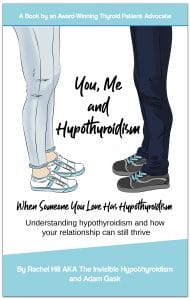
You, Me and Hypothyroidism: When Someone You Love Has Hypothyroidism, a book for those who know someone with hypothyroidism. It deals with many of the misconceptions and pain points that relationships encounter with a hypothyroid person.
It looks at fertility, libido, adjusting to dietary changes, medical appointments, employment, mood swings, pregnancy, housework, social events and more.
References:
[1] https://www.ncbi.nlm.nih.gov/pubmed/3066320
A Book for Children:
Thyroid Superhero: A Kid’s Guide To Understanding Their Grown-up’s Hypothyroidism, which helps children to understand their caregiver’s thyroid medication, flare days, symptoms and much more.

